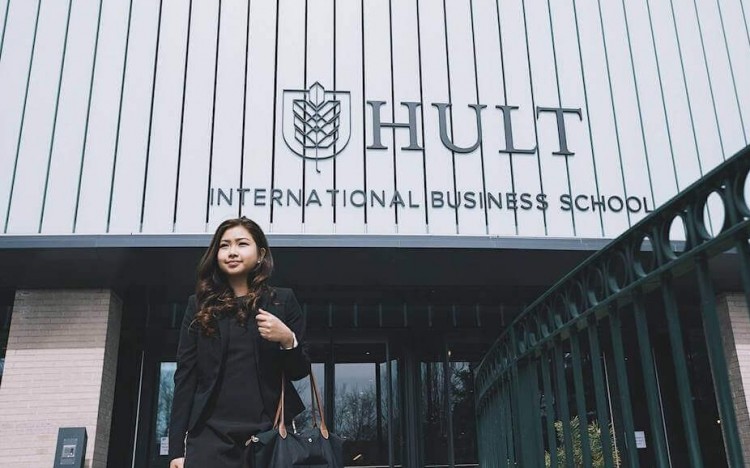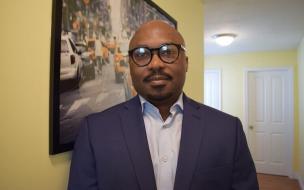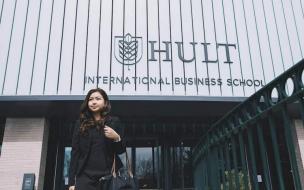It was a chance opportunity to attend a hackathon while working as an IT consultant that first sparked Rebecca Wald’s interest in entrepreneurship.
“I couldn’t really code—I did it at university but I was pretty useless—but I organized the development of the team and we actually won every single prize,” she recalls.
“The event changed everything. I went from being an IT consultant to actually being an entrepreneur.”
Inspired by the hackathon, Rebecca (pictured) pioneered the creation of an e-health blockchain project which focused on medication management.
By utilizing blockchain technology, Rebecca and her team aimed to create a network of medication information, which patients could share with doctors, pharmacists, and insurance companies. This system reduces the likelihood of errors, and makes in-person visits to a doctor or pharmacist unnecessary.
Rebecca’s interest in health technology stems from her family— “my whole family consists of doctors, and I was always the black sheep!” she explains—but it’s a larger problem that inspired Rebecca to apply blockchain to the health industry.
“In Germany, 25,000 people a year are dying because of medication errors,” Rebecca reveals, “and that’s because we don’t have access to all the medical information. A doctor won’t necessarily know all the medication that you are taking.”
While the technology was certainly making medication management easier for patients, Rebecca saw a flaw in the project. “From a business and marketing perspective the project really wasn’t that good, because people who take medication don’t really care about blockchain. We were marketing it completely wrong,” she explains.
Read: From Big Data To FoodTech, Business School Students Explore Disruptive Technology
© Freestocks
Rebecca saw this as a sign that further business skills could boost her future endeavors, and chose Hult International Business School as the place to gain those skills.
Hult’s Global One-Year MBA program was ranked in the top-50 MBA programs in the world by The Economist in 2018, and Rebecca says the program was recommended to her by friends who transitioned into the technology sector after graduating.
“Everything they do at Hult is very task orientated. It’s not a lot of sitting there and writing tests; it’s a very disruptive way to do your MBA.”
At Hult, students have the chance to participate in a number of projects throughout the year that offer students the chance to solve real business problems, putting their teamwork and problem solving skills to the test.
One of these is the Hult Business Challenge, a module where students can either decide to work on a consulting or entrepreneurship project. Alongside four other students and an experienced business partner, Rebecca is working to create ‘Evo’, an asset-backed impact investment fund.
“Today, if you want to invest in a profitable low risk fund, you have to invest with a certain amount, or a big-ticket investment, Rebecca explains.
She says Evo harnesses the money and passion of less experienced investors by decreasing minimum investment amounts and management fees and increasing accessibility. This is achieved by modernizing impact investment funds using technologies and impact investment expertise.
The project was born from conversations Rebecca and her peers had with their professors at Hult, and Rebecca says that without the support from the school, she wouldn’t be applying her business knowledge to such wide-reaching, as well as disruptive, projects.
“It’s extremely important to have a strong business foundation if you’re working with new technologies,” Rebecca says.
“You can fall in love with the technology really quickly, but you can think too much about the system itself and not the value driven aspects—the reality is nobody cares about the encryption standard because it doesn’t say anything to them,” she explains.
Read: How Hult International Business School Inspired Me To Launch A Social Startup
With her Hult MBA, Rebecca is confident that she’ll have the exposure and knowledge to make waves in the technology sector in the future.
Thanks to Hult’s unique campus-rotation model, students have the chance to study in three of Hult’s six global campuses—Boston, San Francisco, London, Dubai, New York, and Shanghai—during their one-year MBA, and Rebecca is taking advantage of the chance to live and study in global technology centers.
“I’m going to Shanghai and San Francisco in my final semester, which are two of the most interesting tech cities in the world right now,” she reveals. “I’ll get a chance to talk to lots of professionals and pitch ideas, so that is really exciting.”
For Rebecca, the business knowledge she has now is going to be hugely beneficial to future projects—and help to avoid those business gaps she experienced while working on her e-health blockchain project.
“We tend to do a lot of things in tech which are beautiful but don’t have any feasibility,” Rebecca muses. “One of the biggest advantages of doing an MBA is that you re-sharpen that business mindset that you might have lost.”









